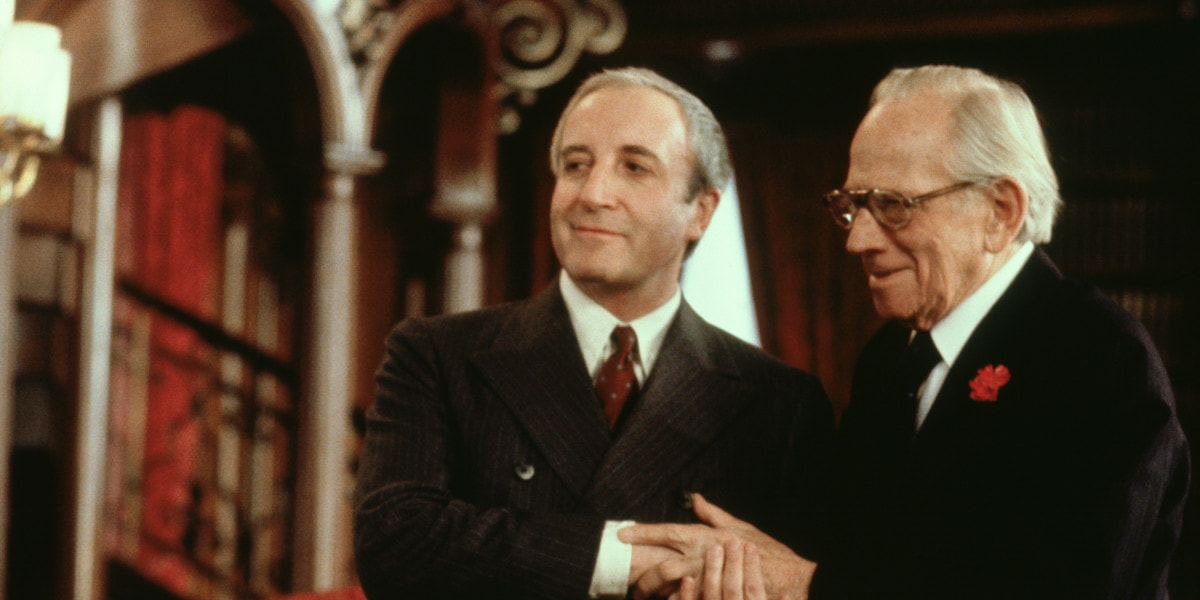There’s a whole industry of corporate-speak seminars and social mirroring that owes a level of credit to Being There. Adapted by Jerzy Kosinski from his own novel, the film has a firm grasp on how to snow people by holding uncomfortable silences like nothing’s wrong, speaking while saying exactly nothing, and letting the other party fill in the gaps. If intelligence and critical thinking instills a level of humility, then the powerful of Being There are all idiots. The presence of real-life credulous moron MacLaine accidentally reinforces the satire, wherein a level of wealth and success in no way insulates a person from being taken advantage of, even by a person without a nefarious bone in his body.
That Chance is able to fool so many people makes Ashby’s film a potent metaphor for privilege long before that word grew to an ever-larger font in the leftist commentariat’s word cloud. Chance’s benefactor created a high-walled bubble for himself and Chance, as the viewer is kept from an outside-view of the estate until a shocking reveal set to a remixed Thus Spake Zarathustra. It’s an oblivious island of wealth in a decaying urban environment, like the last hold-out ranch home in a gentrifying block of townhouses except from the opposite economic perspective. This visual metaphor gets a broader equivalent in the way the Rand’s and people in a similar strata live their entire lives, cocooned off in the endless pursuit of more square footage and the staff to maintain it. That Chance is able to look the part gets his foot in the door, and thanks to the erroneous assumption that success in one area confers competence in all others, Rand’s blessing upon Chance immediately grants him entry into the upper crust as one more eccentric millionaire so removed from society that it makes no difference that he speaks in gardening metaphors. This is occasionally a very funny film, but it’s also enraging as a representation of the arrogance of a ruling class too in thrall to power to question itself.
Sellers’ reputation for comedic genius is something I’ve only seen in the multiple characters he played in Dr. Strangelove, and his work in Being There is far away from ex-Nazi scientists and stunned British officers. He’s wholly committed to the bit, a placid expression on his face whether he’s out for a stroll or chatting with the President. Though Chance is an unwitting charlatan, he remains likable as nothing more than a sounding board for whoever he’s in contact with. He’s not unlike a video game protagonist, a vacant abyss that the player brings their own motivations to. The few times that Sellers does break, it’s in response to nakedly human circumstances that otherwise don’t impinge on the gilded, self-made cages Rand and the people like him live in. Chance obviously has some kind of disability, but Sellers wisely doesn’t play him as having tics or an altered way of speaking, and instead conveys his low IQ through naivete and guilelessness. It’s one strong choice of many for Sellers in what was sadly one of his last and most acclaimed role, harkening towards greater and greater things before tragedy struck.
In the world created by Ashby, Kosinski, and Sellers, the populace across all classes is so starved for honest plain-spokenness, that they’d rather have an illiterate than a doctor if at least the illiterate can convince them that things are going to be ok. Who cares about expertise when gobbeldy-gook about planting and seasons sounds right? Being There was relevant in the late-70’s, and the species hasn’t so leveled up their collective faculties that the same lessons don’t need to be relearned forty years later. B+

 RSS Feed
RSS Feed